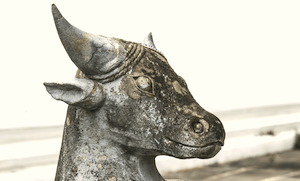Two Cheers for Idolatry
- DAVID CARLIN
It is the most natural thing in the world for human beings to have an appetite for sacred things.
 Emile Durkheim (1858-1917), the great French sociologist-philosopher, said that religion is "a set of beliefs and practices having to do with sacred things." If so, at least two things follow.
Emile Durkheim (1858-1917), the great French sociologist-philosopher, said that religion is "a set of beliefs and practices having to do with sacred things." If so, at least two things follow.
- You can have a religion without God (or gods) provided it has to do with what you feel to be "sacred things." Which means that Communism can be your religion, or Nazism, or LGBTQ-ism.
- You can have a God-centered religion that includes many "sacred things" in addition to God. Catholicism is this kind of religion.
Some religions have the idea that venerating sacred things other than God is sheer idolatry, the worship of false gods; accordingly, they make strenuous efforts to avoid it or at least keep it to a bare minimum.
Islam is such a religion. In practice, it has never confined veneration to Allah alone, for it regards the Qur'an as a very sacred book and the prophet Muhammad as a very sacred person. And it has a multitude of sacred clerics, sacred days, sacred places, etc. But it has at least tried to avoid idolatry. Its greatest success along this line lies in avoidance of sacred images.
In the eighth and ninth centuries, certain Roman (Byzantine) emperors made a very serious attempt to ban the veneration of sacred icons on the grounds that such veneration was idolatry. These "iconoclasts" (as they were called) were no doubt influenced in their opinion by the fact that their empire stood right next door to the Arab/Muslim empire. Islamic anti-image ideas had infiltrated many Christian minds — much the way that today certain atheistic ideas (e.g., the moral permissibility of abortion) infiltrate many Catholic minds.
Many orthodox Christians were strong believers in the religious duty of venerating icons (these people were called "iconodules"). They struggled against the iconoclasts, and eventually they prevailed. To this day the Orthodox Church remembers and celebrates this triumph of the iconodules.
Although the controversy over icons was an Eastern, not a Western event, the pope got involved by endorsing the position of the iconodules, and the defeat of the iconoclasts in the East assured that the Western Church would be free to continue, in addition to its worship of God, with its veneration of less-than-God sacred persons, places, and things.
During the Reformation, Protestants — especially Puritans, the most Protestant of all Protestants — were strongly opposed to idolatry, and it was one of their great complaints about Catholicism that it abounded in "idolatry." Puritan-minded Protestants were horrified by the bad Catholic habit of seeing sacredness in many things that Puritans saw as being purely profane or man-made — such things as shrines, pilgrimages, priestly vestments, crucifixes, rood screens, statues of saints, stained-glass windows. They particularly detested what they saw as the Catholic tendency to treat the Virgin Mother of God as if she herself was equal to God.
To this day the Orthodox Church remembers and celebrates this triumph of the iconodules.
For the Puritans, there were only two really sacred things: the supreme sacred thing, God, and a secondary sacred thing, the Bible. Protestants (all of whom tended toward Puritanism) got rid of five of the seven Catholic sacraments, and the two they retained, Baptism and the Eucharist, lost much, though not all, of their sacredness. They closed monasteries and convents. They demolished a great deal of Catholic religious art. In England, they allowed many Catholic religious buildings to fall into ruin.
Well, I disagree with the Muslims, the iconoclasts, and the Puritans. I think a certain amount of "idolatry" is a good, not a bad thing — provided it's the right kind. And what is the "right kind" of idolatry? It's the kind that doesn't allow the "idol" (if we want to call it that) to displace God as the supreme sacred thing. It's the kind that recognizes God as the supreme sacred thing and the fount of all sacredness. It's the kind that allows that all other-than-God sacredness is something that "trickles down" from God.
The wrong kind of idolatry is the kind that allows the idol to displace God as the supreme sacred being. The wrong kind of idolatry makes Lenin or Stalin or Hitler or Mao or Germany or France or the USA or one's political cause or own's self the supreme sacred being. It's idolatry tantamount to atheism.
Well, I disagree with the Muslims, the iconoclasts, and the Puritans. I think a certain amount of "idolatry" is a good, not a bad thing — provided it's the right kind.
There is a great danger of course that the "right kind" of idolatry will slide over into the wrong kind. For instance, there have been Catholics who have allowed their devotion to Mary, otherwise a fine thing, to slide over into Mariolatry. And there have been many Catholics who have allowed their otherwise magnificent devotion to the Church (the "bride of Christ") to become more important than their devotion to God.
The "spirit of Vatican II," if not the Council itself, was iconoclastic. It did away with, or at least greatly diminished the significance of, many of the lesser sacred things (the "idolatrous" things) that had marked Catholicism for centuries, e.g., altar rails, the habits of nuns and religious sisters, meatless Fridays, Latin (a sacred language), rosary beads, religious medals. And by emphasizing the idea of the priesthood of all believers, it diminished the gap between ordained priests and laypersons. And the effect of this diminishing has not been to enhance the sacredness of the laity; no, it has been to reduce the sacredness (that is, the feeling of sacredness) of the priesthood.
It is the most natural thing in the world for human beings to have an appetite for sacred things — little sacred things, medium-sized sacred things, and really big sacred things. Deep down we have a sense that sacredness (or holiness) is the one thing that truly matters. In the old days, Catholicism did a great job of satisfying this appetite for the sacred, offering in its marketplace of sacred things a multitude of sacred objects that could satisfy both the saintly and the superstitious.
Those days, alas, are gone, at least for the moment in North America and Europe.
 This is Meaghen Gonzalez, Editor of CERC. I hope you appreciated this piece. We curate these articles especially for believers like you.
This is Meaghen Gonzalez, Editor of CERC. I hope you appreciated this piece. We curate these articles especially for believers like you.
Please show your appreciation by making a $3 donation. CERC is entirely reader supported.

Acknowledgement
 David Carlin "Two Cheers for Idolatry." The Catholic Thing (December 10, 2021).
David Carlin "Two Cheers for Idolatry." The Catholic Thing (December 10, 2021).
Reprinted with permission from The Catholic Thing. All rights reserved. For reprint rights, write to: info@thecatholicthing.org.
The Author
 David Carlin is a retired professor of sociology and philosophy at the Community College of Rhode Island, and the author of The Decline and Fall of the Catholic Church in America, Three Sexual Revolutions: Catholic, Protestant, Atheist, and most recently Atheistic Humanism, the Democratic Party, and the Catholic Church.
David Carlin is a retired professor of sociology and philosophy at the Community College of Rhode Island, and the author of The Decline and Fall of the Catholic Church in America, Three Sexual Revolutions: Catholic, Protestant, Atheist, and most recently Atheistic Humanism, the Democratic Party, and the Catholic Church.




